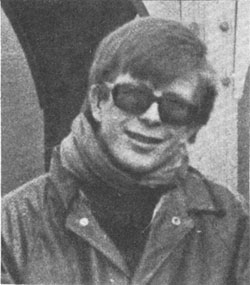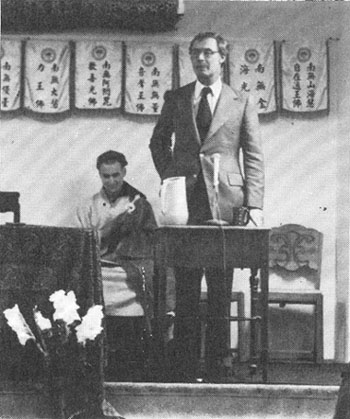|
Not long after, seeking a new life-style. Lee Eagleson
"hit-the-road" for two years, searching from Ohio to Oregon, drifting
through emotional turmoil, turbid days of intoxication and general
dissatisfaction with his life prospects. In 1974 he met Kuo Ying Brevoort, a
supplier of Chinese herbs who produced a copy of the Venerable Abbot's
biography. Kuo Li read it and experienced a remarkable flood tide of dreams,
which peaked in November of that year. At Brevoort's farm Kuo Li encountered a
photograph of the Master, which triggered an intense flow of emotion. He
recognized the smile and the features as identical to those of the elder Chinese
in his dreams of 1972.
Seizing
on this unique co-incidence. Lee decided to take up residence in the drafty barn
on the farm, and during the next five months had at least two dreams a week of
the Master—some were instructional, some were spectacular. For example in one
dream he envisioned the lecture hall at Gold Mountain as it actually is, with
Dharma-protector Wei-t'ou Bodhisattva standing to the left of the Abbot's high
seat as he delivers the nightly sutra lectures. Everyone in the hall listened in
reverence with joined palms and strangely enough, Wei-t'ou Bodhisattva held a
note pad and occasionally wrote down his observations of the assembly. Kuo Li
had never seen a Gold Mountain Dharma assembly and the traditions here were
completely unknown to him at the time.
Kuo Li read the Amitabha Sutra while at the farm and he
took up the practice of reciting the name of Amitabha Buddha at all times:
during the day while working and even during his sleep. Kuo Li found he could
recite the Buddha's name in his dreams. Once in a dream a voluptuous demoness
attacked him sexually but Kuo Li remained unmoved, his single-minded recitation
halted the demon and subdued its evil intent.
After five months on the farm his dreams led Kuo: Li to
Gold Mountain itself. With a strong feeling of purpose and destiny Kuo Li
hitchhiked south from Oregon, walked through the door of Gold Mountain on July
27th, and took refuge one week later. Since then, his dreams have been coming up
at a rate of dozens per month, as if to make up for lost time.
These
were the circumstances leading to the curious matter of lapis lazuli, the Dharma
name selected for Kuo Li by the Venerable Abbot. Long before the refuge ceremony
Kuo Li selected a gift for the Master, a prized possession
of small intrinsic worth but one with a great deal of significance to Kuo Li. It
was a blue stone, a rough-hewn piece of lapis lazuli. Kuo Li decided without
telling anyone else that since he was so attached to this rock it would make an
appropriate offering to his new Master. The decision was secretly made and the
ceremony took place. Kuo Li approached the Master after taking refuge with the
Triple Jewel to present his gift and to find out the meaning of his Chinese
Dharma name. He handed the stone to the Master and explained its personal
importance, and identified it as a piece of lapis lazuli. He then asked,
"What does Kuo Li mean?"
The Master said, "It's one of the seven precious
things--lapis lazuli, of course--your name is Kuo Li, the fruit of lapis
lazuli." Kuo Li was shocked and overjoyed--a feeling that persisted for
days.
One week later, during a Kuan-yin recitation session,
four people left the home life. The ceremony and the events surrounding it
deeply touched Kuo Li. He resolved to stay at Gold Mountain and to cultivate the
unsurpassed way of all Buddhas.
Since
that summer, his seeds of Bodhi planted in the past have ripened, and Kuo Li has
brought forth the firm resolve to leave the home life himself. He says,
"The Master's kindness and compassion have won me over to enable me to make
the first truly positive and strong commitment of my life."
Lead
unerringly by his dreams to this new vision of reality, Kuo Li Eagleson will
soon don the robes of a sramanera to devote his skills and energies to
establishing and helping make flourish the Orthodox Dharma in the West. Truly a
dream come true!
"In
the future you will become a mayor by the name of
GEORGE
MOSCONE
|

